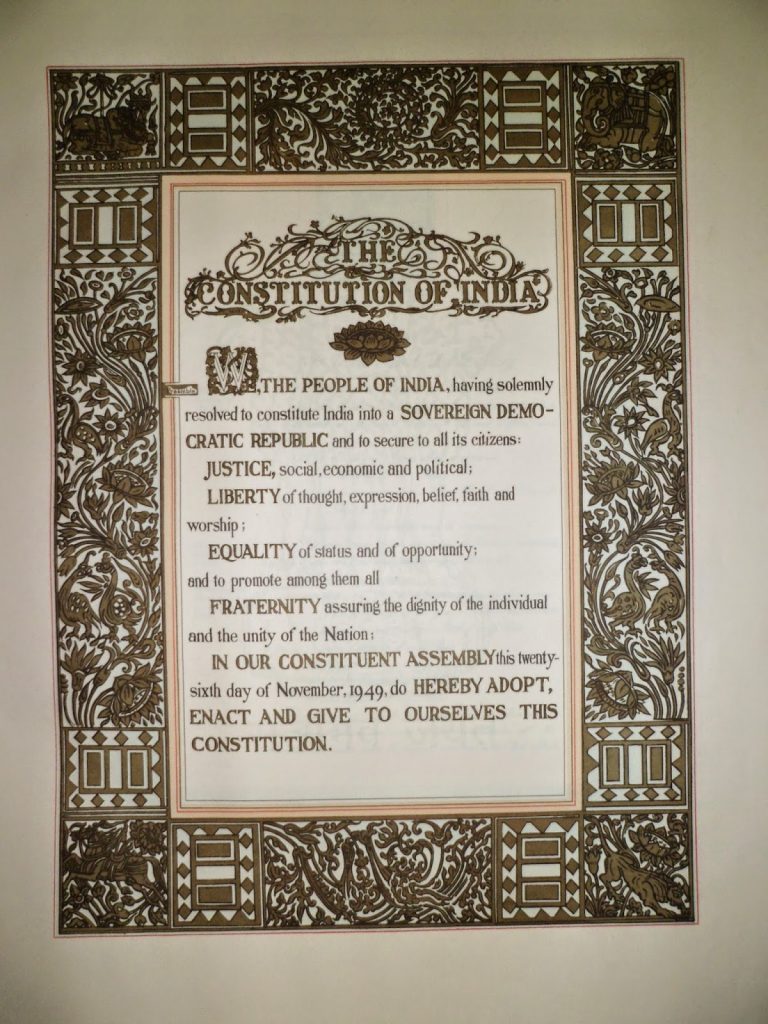
India’s freedom in 1947 was a watershed event in the world history as it marked the end of the colonial era that dominated the world affairs for centuries before that event. It was India’s freedom that really broke the bulwarks of the colonial system throughout the world. With the achievement of independence in 1947, the long and arduous journey began. We had to choose for ourselves a political system that suited our history, ethos, genius and needs. Also we had to draft and adopt a Constitution for India and above everything we had to build a nation.
Framing and adoption of an acceptable Constitution and political system for a country of India’s past, size and nature was no easy task. For the founding fathers, the Constitution was an instrument of social engineering and nation building. Their dream was to build a united Nation , remove poverty, backwardness and illiteracy. The founding fathers had a vision for India and this vision is enshrined in the Preamble, the Fundamental Rights and the Directive Principles. The supreme values of the Constitution are Socialism, Secularism, Democracy, Justice, equality, Liberty, Fraternity, Individual dignity and unity and the integrity of the Nation.
- One of the salient features of the Constitution is Adult Suffrage which meant a five fold expansion of the electoral rolls in comparison with those for the 1935 Constitution. This demonstrated that the will of the people is paramount. Its introduction was made in the full belief that would enlighten the people and promote their wellbeing, the standards of life, comfort and decent living of the common man.
- The system of Parliamentary Democracy was chosen in keeping with our old traditions. Existence of deliberative representative bodies and democratic self-governing institutions could be traced back to as early as the Vedic age. Vedic political theory recognized ‘Dharma’ as a true sovereign. And Dharma was not religion but corresponded most nearly to the modern concept of Rule of Law.
- Parliamentary government and legislative institutions in their modern connotation owe their origin and growth to India’s British connections. However the Parliament of India and the parliamentary institutions have an organic growth on Indian soil. They grew through long relentless struggle for freedom from foreign rule.
- The Constituent Assembly accepted the principle of the Parliamentary executive collectively responsible to the Parliament.
- We have the four cornerstones of the world- Equality, Liberty, Fraternity and Justice. Liberty is meaningless without equality; equality would be irrelevant if it does not promote fraternity and fraternity is purposeless if it does not result in justice. Therefore an integrated view was taken and all the four concepts are enshrined in our Constitution.
- The juxtaposition of Fundamental Rights with Directive Principles is another important feature. to put in a nutshell , our Constitution is the Magna-Carta of hopes and aspirations of the people.
- The chapter on Fundamental Duties has been introduced to establish a democratic balance. The Fundamental Rights cannot bear the fruit without the performance of duties.
Conclusion:
The convening of a new Constituent Assembly as is advocated quite often but a question arise whether it would be like opening the Pandora’s Box. The Constituent assembly had the background of long and arduous struggle of freedom and tremendous sacrifice behind that struggle. The Constitution had stood the test of time signifying its strong foundations. The Constitution in order to be relevant and meet the emerging challenges has to grow with the changing needs of the society. It is well expected that some provisions of the Constitution may require amendment based on the needs and the aspirants of the people. The power to make such amendments should be there in the Constitution and if the need be, let us mend or improve the Constitution. The Constitution should absorb the progressive trends that reflect the will of the people.
In the words of Dr. Rajendra Prasad , the first President of India, ” Our Constitution so far has evoked many controversies and raised many questions which had very deep differences, but we have , somehow or other, managed to get over them all. This was one of the biggest gulfs which might have separated us…We have done the wisest thing possible and I am glad, I am happy , and I hope posterity will bless us for this.”
